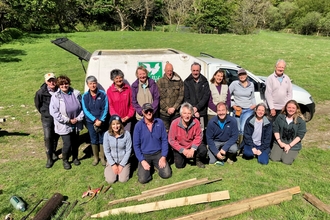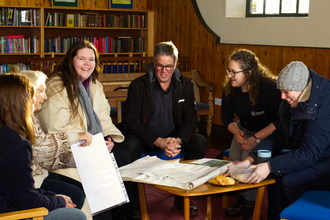Creating a space for nature near you
Image copyright Hampshire & Isle of Wight 2024
Have you got your eye on a patch of land in your area?
Perhaps it would make a great space to grow some vegetables and herbs for the community, or wildflowers for bees and insects, or maybe it needs a bench and a bit of a tidy up.
You can take it over if you want to!
Guidance differs between England, Scotland, Wales and Northern Ireland. Please check carefully.
Who owns the land?
- Ask your Local Authority (council). Find out who your Local Authority is by clicking this link and entering your postcode. Then go to their website and send an email to their enquiries email or planning email or ring them. They might have their own deeds records or County Record Office.
- If the Local Authority doesn’t know, then simply ask the local shops, businesses, and houses.
- Around 85% of the land in the UK is registered with the Land Registry. It will cost £3 to do an online search. Click here for England and Wales only.
Click here for the Scottish Land Register.
Click here for Land and Property Services in Northern Ireland.
As your patch of land won’t have an address, you’ll need to do a map search. You can use the online map, and if you want to double-check, you can ask for an “index map search.”
You could also check the Land Registry records for the properties and land next to the land you’re interested in, as sometimes they might say “plus the adjoining land” or similar.
Index map search:
This costs £4 and you need to submit form “SIM” with as much information as possible, and an Ordnance Survey map reference. Find out more at the government website.
But note! Even if some land is not registered, it still doesn’t mean that no-one owns it – so don’t assume you can just take it over. Do as much research as you can.
Do you want to buy it?
This is unlikely for a community project, but you might get asked by the council about “Assets of Community Value.”
Every Local Authority in England keeps a list of these Assets. They are buildings or land that are “mainly in actual use for the social, well-being or social interests of the local community”. So, this can include parks and green space. If an Asset goes up for sale, then local people are allowed to come together and bid for control over it, by forming a Community Interest Group or other specified typed of group. Find out more here and here. This only applies in England.
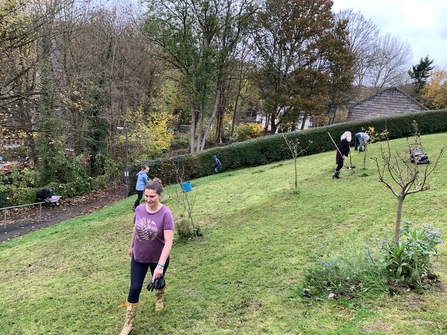

Grow Batheaston Community Group took over a patch of grass near where they live in Bristol.
Image Copyright Stephanie Sharkey, Avon Wildlife Trust 2024
Do you just want to use it?
This is the most likely choice for a Nextdoor Nature group.
You will need the landowner’s permission. In some cases, there will also be a leaseholder who rents the land from the landowner: for example, a car parking company which rents land from the council. It took a local group two and a half years to negotiate for the use of a small strip of land alongside the carpark (an extreme example!). You’ll need to talk to both the landowner and the leaseholder.
You might be asked for a risk assessment – see our separate guidance. They will probably want to see a plan for what you want to do, so be ready. And they could want to do a “utilities survey” first. You definitely don’t want to dig through an electricity cable!
Do make sure there is a contract which states who is responsible for what, and for how long. It does not have to be complicated, but it does have to be clear. They may put restrictions in place, such as a ban on using power tools, or certain rules about how the land can be used.
Check with the planning department of your Local Authority about planning permission. Simply growing food will be “agricultural” but if there’s a building on the land and you’re going to be doing other activities, it may need a change of use.
You will need to consider insurance such as public liability insurance. Talk to your Local Authority, and also see our document about Insurance for Groups.
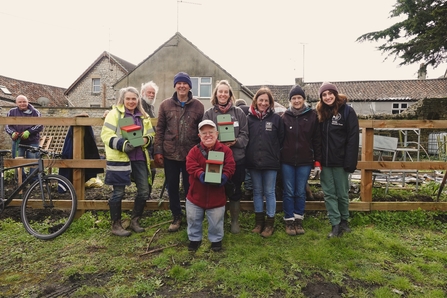

Resident of Paulton in Somerset transformed a rubbish tip behind their local pub into a community garden after speaking to the pub owners.
Image Copyright Avon Wildlife Trust
What’s your plan?
You do need some kind of plan so that you know who is responsible for doing what.
You also need to know how this project will be sustained. You can’t just plant something and expect it to look after itself. What happens in winter? What happens next year?
Will you need a budget? You might need funds for the insurance, or tools, or publicity. Think about fundraising – we have documents and advice about that.
Finally, you’ll need a crisis plan or list of things to do in an emergency. What if something happens to the land that you’re responsible for? A fire, perhaps? Or someone critical to the project becomes ill or moves away. Come up with all the possibilities, and what you can do to stop them happening, or what you’d do if they did happen.
Need to know more? Follow these links!
The government is trying to make it easier for you to grow food in your community. See here.
The Royal Horticultural Society has useful information about community gardening here.
Social Farms and Gardens has information for city farms and community gardens. They are also funded to support projects in Wales, but they have advice for all four nations here.
The Open Spaces Society has very clear information about Assets of Community Value in England here and find out how to bid on Assets through My Community here and here. This document from My Community tells you more about Community Assets in England, bidding for ownership, and other ways to reclaim land here.
Find out more about Scotland’s community right to buy here.
The government has advice on reclaiming land here.
The Wildlife Trusts has various other practical resources
- How to start a wildlife garden from scratch (https://www.wildlifetrusts.org/actions/how-start-wildlife-garden-scratch)
- How to grow a wild patch (https://www.wildlifetrusts.org/actions/how-grow-wild-patch-or-mini-meadow)
- Climate-friendly gardening (https://www.wildlifetrusts.org/actions/climate-friendly-gardening)
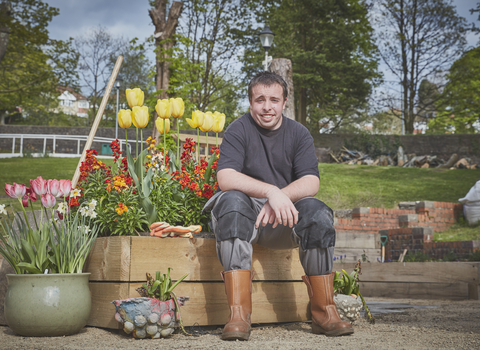
The Wildlife Trusts
Have you been part of a community nature project?
We'd love to hear from you! Your experiences will be shared right here on the Community Hub and will inspire others to take action in their own neighbourhoods.


CC by 4.0 attribution
Except where noted and excluding images, company and organisation logos, this work is shared under a Creative Commons Attribution 4.0 (CC BY 4.0) Licence.
Please attribute as: “Nextdoor Nature (2022-2024) by The Wildlife Trusts funded by The National Lottery Heritage Fund, licensed under CC BY 40”


